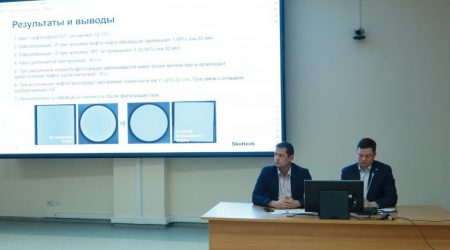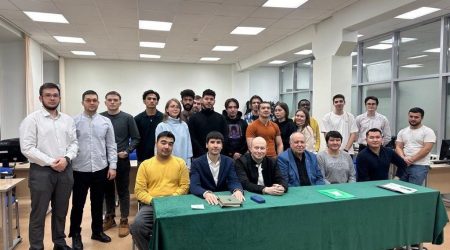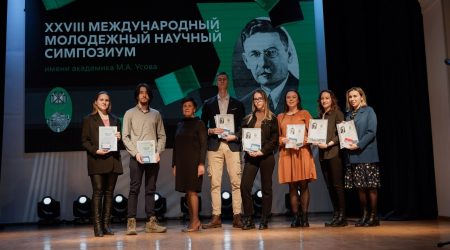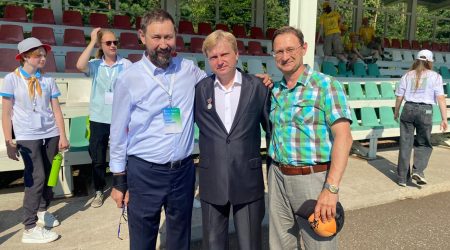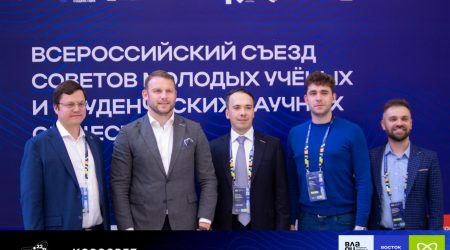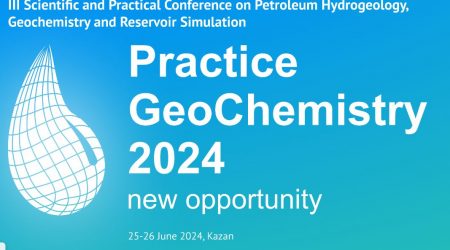Breakthrough Russian Technologies for Mature Oil and Gas Fields in the Focus of Economic Efficiency, Digital Transformation and Decarbonization panel session held as part of Russia – Islamic World KazanForum 2024




The event took place at Kazan Expo on 15 May.
KFU’s Institute of Geology and Petroleum Technologies was represented by Vice-Rector for Earth Sciences Danis Nurgaliev, Institute Director Vladimir Silantyev, Deputy Director for Marketing – Director of the Center for Advanced Training Ildus Chukmarov, Deputy Director for Research Anton Kolchugin, Deputy Director for Academic Affairs Andrey Teryokhin, Deputy Director for Innovation Vladislav Sudakov, and others.
The panel was moderated by Daniil Sorokin, Director of the All-Russian Research Institute of Ecology (Ministry of Natural Resources and Ecology of Russia).
Konstantin Tsyganov, First Deputy Minister of Natural Resources and Environment of the Russian Federation, opened the panel session. He emphasized that the forum is one of the key platforms for economic interaction between Russia and the countries of the Islamic world.
“Fossil fuels do not lose their relevance and are still the main source of energy, so the development of environmentally friendly, energy-efficient and cost-effective technologies for forecasting, exploration and production of hydrocarbons remains one of the key tasks facing our countries. Every year the structure of reserves deteriorates and most new fields require substantial investments. The key organizer of the strategic session is the World-Class Research Center of the Rational Development of the Planet’s Liquid Hydrocarbon Reserves, the development strategy of which is aimed at addressing these challenges,” said Tsyganov.
Yevgeny Petrov, Head of the Federal Agency for Subsoil Use (Rosnedra), emphasized that the most important problems of the oil and gas industry are related to the production of hard-to-recover reserves, where the share of domestic equipment does not exceed 60 percent.
In his report, he pointed at Rosnedra’s technological developments for the industry. For instance, the agency’s GIS Integro software is now being developed and is already in use by many national companies for the purposes of geo-information support.
Vice-Rector Nurgaliev’s report was titled Technologies of the Center for Liquid Hydrocarbons in relation to the challenges facing the OIC countries. He emphasized that the fundamental and applied research conducted at the scientific center in environmentally friendly resource-saving energy, effective rational use of subsoil and biological resources is aimed at achieving goals within the framework of the possibility of effective response of the research community to existing challenges, taking into account the increasing relevance of the ethical aspects of scientific and technological development, changes in social, political and economic relations.
“The round table was devoted to the review of the best fundamental and applied results of research activities of the Center, the prospects of international cooperation in their implementation in Russia and the countries of the Organization of Islamic Cooperation, partnerships in scientific and technological development in geological exploration, geology, geochemistry and oil production. The participants of the discussion assessed the potential of environmentally friendly and energy-efficient technologies with the use of intelligent methods of processing geological and field data developed by the Center, which are aimed at reducing the costs of exploration and development of new fields, reducing the costs of well drilling, increasing oil production, reducing oil loss during geophysical surveys with a significant improvement in environmental prospects from their implementation,” said the Vice-Rector.
Minister of Electricity and Renewable Energy of Libya Awad Ghaneiwa Mohamed spoke about his country’s policy in renewable energy sources. According to him, utilizing the abundance of sunlight, the country has made great strides in reducing dependence on fossil fuels and cutting harmful emissions.
The session also featured contributions by Dmitry Guskov, Deputy Minister of Industry and Trade of the Republic of Tatarstan, Alexander Dyakonov, Rector of Almetyevsk State Technological University – Higher School of Petroleum, Yelena Tishchenko, Advisor to the Dean of the Faculty of Economics of Moscow State University, Jaziri Alkaf Abdillah Suffian, Associate Partner at WIPPD (Malaysia), and Tamer Saeed Ahmed Al Shanfari, Chairman of Trans Gulf Energy LLC (Oman).
Ms Tishchenko offered the expertise of Moscow State University and the Institute of Economic Forecasting (Russian Academy of Sciences) for structured feasibility studies of the technologies developed by the Center for Liquid Hydrocarbons for their further implementation.
The forum became not only a platform for presentations of scientific and technical achievements, but also a place to meet and establish business relations with foreign companies.
“We discussed the prospects of cooperation in higher education and advanced training with representatives of Malaysia, Oman, Uzbekistan, and Kyrgyzstan,” shared Ildus Chukmarov. “We offered training various formats of advanced training, professional retraining, and personalized tracks. We have experience in conducting advanced training courses for Islamic audiences. We have organized courses for Iraqi specialists with prayer breaks and halal catering. We have offered internships and training for representatives of United Arab Emirates, Uzbekistan, and Kyrgyzstan. CdoGEO has already established itself as an exporter of training programs, including such in the Islamic world.”
The parties agreed to hold the next meeting on the development of partnership mechanisms for technology implementation and training at an international conference on the development of hard-to-recover hydrocarbon reserves at the Higher School of Petroleum in Almetyevsk in September 2024. The foreign participants of the session noted their interest in continuing the dialogue on this platform with the involvement of companies of the oil and gas industry of these countries and the Center for Liquid Hydrocarbons in the areas of hydrocarbon production, desulfurization, and water production.




